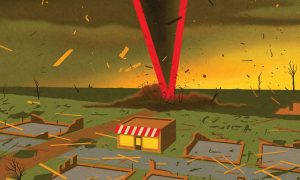1. Diversified the supply chain
“In early 2020, we found ourselves crippled. Our signature pink paper came from a supplier in Italy, our glassware came from another in China, and all our manufacturing was done at a facility in Los Angeles. Each of these critical partners was shut down at one time or another. We learned we had to diversify our manufacturing and supply-chain base. So we now work with four manufacturers in L.A. to make our fragrances and candles, and we have agreements with third-party logistics partners to ship our goods.” — Matthew Herman, founder, Boy Smells.
2. Expanded marketing
“We were reliant on digital marketing as our primary growth accelerant. But when COVID hit, people had more on their minds than what cute baby photo was posted on Facebook. So we pivoted our media to traditional TV news, where their eyes were glued — and it worked. Our takeaway was to continually move our media to a balance of emerging and traditional channels that can sustain changes outside our control. It’s already paying off: Because we’re no longer depending on social, the iOS updates with regard to data privacy are less impactful to our business.” — Jacob Zuppke, president and COO, AutoPets.
3. Found virtual solutions
“When our stores temporarily closed, we launched virtual fittings. Now the program sees more than 1,500 fittings a month at full capacity, and we plan on expanding it. We also embraced other virtual tactics, like warehouse sales and live swimwear shopping events, and discovered they reach a much larger audience. Our latest virtual warehouse sale made $2 million in the first 20 minutes. As this virtual world becomes the new normal, we’re already planning to introduce more products this way.” — Joanna Griffiths, founder and CEO, Knix.
4. Refocused products
“As a wholesale fashion brand, in March 2020, we had to manage millions of dollars in canceled orders while maintaining our employees. The solution came from our nonprofit, The Laundry Truck L.A. One of its partners, the city of Los Angeles, asked us to make masks as a donation. We did it and ultimately produced hundreds of thousands of masks and PPE for government contracts, and then developed a premium scrubs line. This not only helped us survive; it helped us thrive. The shift to products that fulfill real human needs will remain central to Dolan.” — Jodie Dolan, founder and president, Dolan Group.
5. Provided human support
“While it’s always been true, the pandemic has made it clearer than ever: Ensure your team feels valued, respected, and supported, and they’ll help your business weather any storm. We’ve doubled down on employee support by improving benefits, embracing flexible schedules, and actively encouraging taking PTO. Our business is only as strong as the people who work here, and we’re now stronger than ever.” — Alli Reed, founder, Stratia.
6. Made new relationships
“From a marketing and retail perspective, the most important thing we did was diversify our activity. Previously, we relied heavily on in-person events and Facebook ads. As a result of the pandemic, we’ve explored other partnership opportunities, podcast and streaming advertising, and selling with other online retailers like Costco. All these steps will help ease any new shock waves in the future.” — Stephanie Schull, founder and inventor, Kegelbell.
The post 6 Ways to Protect Your Business From the Next Disaster appeared first on Entrepreneur
Original source: Entrepreneur






